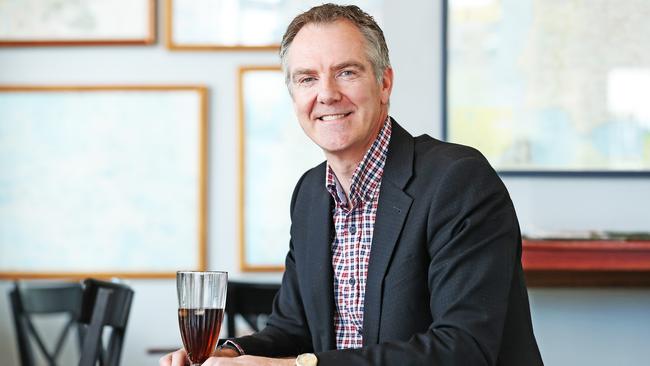Cafe Society: Education is key to our state’s prosperity
From a good education, the milk and honey will surely flow, says accounting expert Carl Harris.

Tasmania
Don't miss out on the headlines from Tasmania. Followed categories will be added to My News.
CARL Harris subscribes to the “all boats rise” school of prosperity, whereby a society’s affluence lifts everyone, not just a few.
We meet at his local cafe, Atlas Espresso in Macquarie St, to discuss why all boats are not rising in the state.
“A lot of it comes down to our education outcomes,” he says. “We have some of the poorest in the country.”
Education, he says, is a great leveller – and as the economy relies more on skills and service industries, a sound K-12 education is today’s prerequisite for personal and community prosperity.
No surprises there, but the Deloitte Tasmania managing partner’s insistence we can’t truly prosper until our population is better-educated comes hot on the heels of two concerning reports.
MORE CAFE SOCIETY:
CAN-SENG OOI: TAKING TOURISM BOOM TO THE NEXT LEVEL
JERRY DE GRYSE: TREAT OUR CITY AS A BREATHING WHOLE
ADAM MARTIN: TEACHING MEN TO LEARN FROM WOMEN
STEVEN BURGESS: MORE COMPACT CITY LIVING NEEDED
On Monday The Tasmanian Chamber of Commerce and Industry released its latest economic assessment, The Tasmania Report, prepared by Carl’s colleagues at Deloitte Access Economics advisory service.
As the Mercury noted in Wednesday’s editorial, it was a mixed bag for education. On the positive side, the Year 12 retention rate is up to 74 per cent, from 68.4 per cent in 2015. Carl says we can thank the Hodgman Government’s regional rollout of Years 11 and 12 at high schools for much of that success, predicting it will be this Government’s greatest legacy.
“People who complete Year 12 are more likely to get full-time employment and higher incomes than those who don’t,” he says. “Full-time work and higher incomes mean less reliance on government support, better health outcomes and a greater ability to afford housing and more.”
The report, though, shows enrolments in vocational training are down by 12 per cent, to 55,700.
It’s a figure that feeds straight into Carl’s concern about a desultory level of upskilling and reskilling to meet emerging workforce needs. He says that at this time of disruption, under-skilled adults often need to re-engage with formal learning, and sometimes that will mean going right back to basics such as learning to read and write.
“We are on the verge of a major scale-up of artificial intelligence, as well as robotics and automation, that will change the jobs of the future and the skills a worker needs.” .
Maintaining a viable working-age population in Tasmania is a huge challenge for the coming decade, he says.
Not only do we need to retain and attract more young people to live here, but we need more of our current population employed and contributing to the state’s productivity.
“That means making sure more people get the right transferable skills and in sectors that will play to our strengths and generate growth,” he says.
Carl hails the upcoming move of the university into the CBD as an egalitarian shift from “elite” Sandy Bay that will also vastly improve physical access via direct public transport routes.
For primary schools, he wants a zoning amendment that prioritises placement of some students from lower socio-economic backgrounds at high-achieving primary schools that may be outside their area.
As author of Deloitte’s thoughtful Be BOLD Tasmania report two years ago, Carl spent countless hours pondering the implications of substandard education on future Tasmanian prosperity.
And a major educational outcomes report released on Tuesday night underlines his concerns about the current state of play.
The Programme for International Student Assessment report reveals Australia has plunged in global educational rankings, with Tasmanian students shown to further trail interstate students in literacy and numeracy.
Carl is an accountant by trade, but he says there’s no way he’d be in a high-level job at Deloitte if his parents hadn’t valued his schooling. Though his father left school at 15 to work at Cadbury’s, he impressed on Carl his wish for him to go to university.
“I wasn’t born with a silver spoon, but I’ve come from a wonderful family environment where we were always encouraged to maximise our education,” he says.
“But I’ve seen the other side, too, if you like, people who didn’t think education were important.”
Breaking that intergenerational under-education pattern is vital work for the state in the next decade, he says. “If we can get on the front foot, then those people won’t get left behind.”
All boats may rise.


